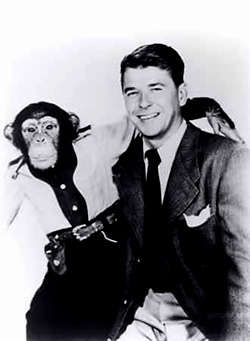Review: Our Basic Nature (aka Bedtime For Bonzo – The Opera?)
Ah the seventies. Vietnam, Watergate, key parties, and brown corduroy as far as the eye could see. Not a great time for ethics (or fashion) in the United States.
So it should hardly be a surprise to hear about a series of experiments where infant chimpanzees were introduced into homes and raised as children, in a bizarre attempt to see how much of their chimpanzee-ness (ie non-human-ness) was due to their environment and upbringing. The results and a subsequent memoir by Dr Maurice Temerlin, one of the foster parents, was the subject of a WNYC Radiolab program that is now being turned into a solo opera by composer John Glover and librettist Kelley Rourke. The American Opera Project presented 30 minutes of this work in progress in the WNYC Greene Space last week and I was fortunate enough to snag a ticket for this standing room only event.
Solo shows are challenging dramatically. There’s one guy (or gal) on the stage. And he needs to say (or sing) stuff. But… who is he talking to? He’s the only one there, so your choices are limited. He could be talking to himself, the audience (the actual audience seated in the theater), a fictional audience (a church congregation, a crowd at a concert, effectively making the actual audience play a role), or some sort of contrived other character, (via phone call, pretending someone else is on the stage, or playing multiple characters in a conversation). I find the most interesting solo shows use a combination of these techniques to keep things interesting. Rinde Eckert and Steve Mackey use about every one of those techniques to great effect in their solo opera Ravenshead. (This is an area of great interest to me right now, as I’m wrestling with these various techniques while finishing up my own solo opera.)
Unfortunately, the work shown so far hasn’t exhibited anything but ‘audience address’, that is, the entire opera (in its current incarnation) has the author of the memoir talking directly to the audience about thoughts and experiences with his inter-species adoptee, Lucy. There’s no attempt at any illusory theater, to pretend that something is happening on stage.
It’s hard to imagine how this will translate into compelling theater. As it is, it feels more like a reading, or a lecture with music. With the exception of purely abstract works, an opera devoid of any theatrical illusion, lacking any on stage action, becomes a song cycle. There is a series of observations and events told second hand, after the fact, with little tension, risk, or immediacy. It’s all tell, no show.
In the talk back following the presentation, the authors seem aware of the issue. The director, Eric Pearson, suggested that the performance was actually Mr Temerlin lecturing to a classroom that had the ability to forgive him for the experiments ultimate failure and his part in it. He also attempts to ‘bring Lucy onto the stage’ with projections of a baby chimp towards the back of the stage. These are germs of strong ideas, and may have informed Baritone Andrew Wilkowske’s sensitive performance of Glover’s nuanced and subtly evocative music, but none of it is in the libretto, and the results are monotonous, if wistfully and earnestly so.
I believe the piece would benefit greatly from a more diverse theatrical palette than simply audience address. Maybe have Dr. Temerlin talking directly to Lucy for a change. Show some of the interactions as they happen instead of telling us in past tense. Take some chances and fictionalize a bit, introduce some challenges, some conflict, maybe even some danger. This story has enormous potential, but this book reading with musical accompaniment approach doesn’t seem likely to do it justice. Let’s hope the authors explore more varied ways of storytelling in future realizations.
